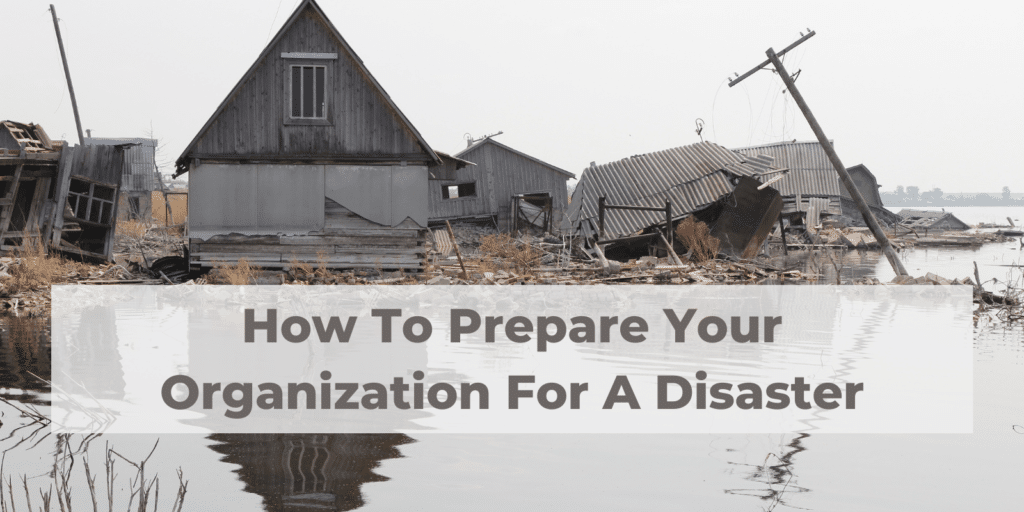Estimated reading time: 4 minutes
I learned on the news today about the devasting flooding going on in Tennessee.
I have family in the area of the flooding so this story hit close to home for me.
The morning news reminded me of the importance of preparing for the unexpected and having a disaster plan.
When I think of the devastation in Joplin, Missouri, after the tornado, the unbelievable destruction of Hurricane Katrina, or the attack of September 11, I become more conscious of the need for emergency preparedness for all organizations.
Organizations both large and small should be prepared for emergencies and have a disaster recovery plan.
When you have a plan, you are a step ahead, and the plan eliminates the need to think through decisions at a time of confusion and devastation.
Ready.gov is a great resource that helps businesses prepare for and respond to disasters. They offer many tools and resources to help teach organizations how to write a disaster recovery plan.
Organizations should stop and take the time to plan in advance of an emergency, so systems are in place to handle any kind of emergency.
The better the emergency plan, the more likely and the quicker an organization will recover from business interruption.
4 Things Organizations Should Think About
1. Understand The Risks
We know that all of life involves some risk, and we learn to take precautions for those risks that pose a higher threat.
Organizations should be aware of their risks and think through all possible disaster scenarios.
Every type of emergency – from natural disasters to terrorist attacks to an armed intruder should be considered and planned for.
A natural disaster response would be very different from an armed intruder, but some of the basic elements may be the same.
For instance, a natural disaster may cause severe damage to your business campus resulting in months of cleanup and repairs. Whereas an armed intruder would require quick thinking and a planned response to keep everyone safe.
When you understand all possible risks, you will ensure sufficient planning and preparation are done.
2. Business Recovery
Unexpected emergencies and disasters often take a business out of operation and stop revenue flows.
Develop a plan that will ensure business operations resume as quickly as possible.
The plan should include recovering computer systems, communication processes, and all necessary business operations.
For instance, if you operate a dry cleaner, your plan would dictate the steps to purchase, install, and begin operating new registers. The plan may also dictate the best way to communicate with customers that the business is back up and running.
We all know how difficult it can be to think when we are overwhelmed by a sudden emergency.
The more detailed the plan, the less you will need to think through tedious details when chaos and emotions are running high.
3. Recovery Kit
Create a grab-and-go kit for your plan.
Every organization should have an emergency recovery kit that is housed somewhere away from the business or organization’s physical building.
This kit would contain information that can be used to help jump-start operations.
Things that might be included in the kit are copies of insurance policies, phone lists of key employees/vendors, disaster manuals, computer programs, and backup computer drives.
But we store all of our documents in the cloud, you might say. My response would be, what if all access to your cloud data disappeared? I know paper documents are a thing of the past, but if you’ve ever walked into a business when the computer systems are down and they are using paper to accept credit card information, you know it does happen.
4. Communication Plan
An effective communication plan is imperative during a time of crisis. Develop a plan that thinks through who, what, where, when, and how to communicate.
For instance, ask (and answer) the questions:
- Who do we need to be communicating with (employees, vendors, customers)?
- What do we need to be communicating to them (details of the situation, the timeline for reopening, help, and support, etc.)?
- Where can we meet to plan, organize, or work while we get our business back in order?
- When will the business reopen, and when will employees be needed to come back to work?
- How will the business deal with the challenges of the emergency?
Answer these questions and have communication be a tab or section of your overall plan.
Why should you invest the time in emergency planning?
Emergency management planning is time-intensive, and many organizations struggle with carving out the time to plan.
However, any organization that has been through an emergency or crisis would attest that the time spent on the front end is well worth the order that comes from having a well-written, documented plan – that merely needs to be executed.
Invest the time to develop your emergency plan. If an emergency ever happens to your business, you may just be glad you did!
Have you put together your emergency management and disaster recovery plan?
